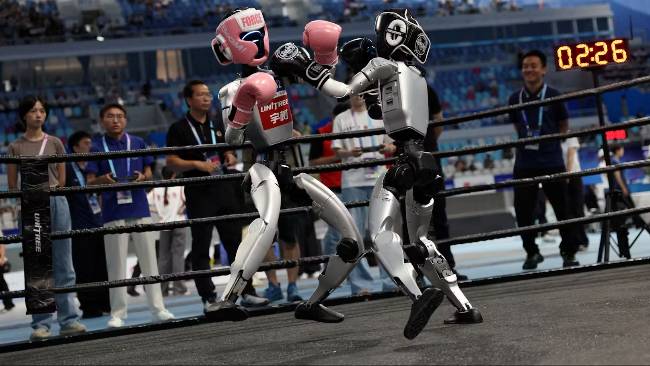The first World Humanoid Robot Games got under way last week in Beijing, featuring over 500 robots from 16 countries, including the United States, competing in Olympic-style events.
Watch this thrilling video and witness the future of sports:
I have been blogging quite a bit about AI and the problematic nature of so much of our technology, but while watching these videos from the robot Olympics (here is an especially funny one that I couldn’t embed), I realized why technology will never take over everything: Our humanity puts limits on the technology we will accept.
What is the difference between watching these robots compete and watching humans compete? The pleasure of sports depends precisely on their human element. We identify with the athletes, care about some of them, dislike others, bond with fellow fans, and bringing communities together. (For example, how about the Milwaukee Brewers fulfilling that perennial prediction posted in George Webb diners, that they would win 12 in a row? They did, indeed passed that mark, and now it’s free hamburgers for everyone!)
Devoted fans know all about the players–their background, how they broke in, their successes and failures, how they fit together as a team, feeling sorry when a favorite gets traded, but feeling excited when a promising new player comes to town. You wouldn’t get that kind of involvement with a bunch of robots. Even TV coverage of the human Olympics consists mainly of giving the athletes’ “backstory,” including feel-good inspirational accounts of how they overcame hardships. You can’t be inspired by a robot.
I remember the early days of the space program when all of us Americans were really excited about all things technological and how great things would be in the year 2000. Looking at what the astronauts ate and drank, I remember being told that our full nutritional needs could be met with pills, powders, and no-cook mixes. (Can anyone remember Tang?)
But human beings like to eat! We like the taste of actual food. Today fresh vegetables are more popular than canned and frozen vegetables. Eight out of ten of us use our TVs to watch cooking shows. Chefs have become the new rock stars.
Human beings are biological entities. We have drives and primal instincts. To eat, yes, but also to breed. Chatbots and sex robots will never do away with romance between actual men and women. Despite the technology of birth control and reproductive engineering, we will still want to have children. We are physical beings and we will always prefer actual reality to virtual reality.
Human beings are social entities. A chatbot will never replace another human being as a friend or confidant. Even though we might be able to work, shop, and entertain ourselves online, we will sometimes want to leave the house. We will often want to be with other people.
I can prove that the virtual world will always be subordinate to the actual world. We judge AI, the metaverse, and movie special effects by how realistic they are. That standard establishes reality as the normative measure.
We gladly use technology insofar as it helps us in our biological or social lives. Agricultural technology that makes food more plentiful, cheaper, and more available–we like that. High tech tools to make us more productive at work–word processing programs, power tools, computer programs–we are all for them. Technology that caters to our biological nature (air conditioning, central heating, indoor plumbing) we love. Technology that caters to our social nature (e-mail, social media, dating apps) we will gladly use.
But once technology presumes to replace us (as in AI taking our jobs) or to work against our physical nature (as in the metaverse) and our social nature (as in chatbot characters replacing our human relationships), we will have problems with the technology. To be sure, many people succumb to the technological environment, marrying their AI avatars and escaping this world by hiding in the metaverse, but this is because of sad dysfunctions. Nearly all of them would rather have a real man or woman to love, and would rather live in a real world in which they could function.
There have been all kinds of technology that we developed, but then chose not to use. Eighty years ago we used nuclear weapons against Japan, but that was so horrible, we haven’t wanted to do that again, keeping our military forces fairly conventional. We developed supersonic aircraft, but we stopped using them because the sonic boom made them too noisy! Flying with jetpacks is possible–the prototypes work–but they seem too dangerous. Human cloning is possible–we do it with animals–but so far it seems morally repellant so it has been legally banned.
Here is my theory: There is a human limit to technology. There are lines that human technologists dare not pass. If they do, the technology will fail to be adopted. Where those lines are may not be clear at the time. But at some point, human beings will assert themselves against technology that undermines their humanness.
What do you think of my theory and analysis?
Photo: World Humanoid Robot Games via Heute.at, CC by 4.0













